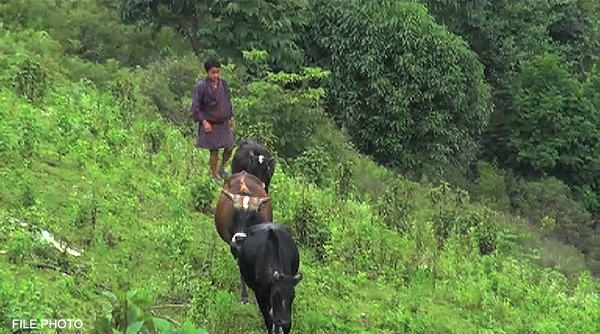 A new study has found out that livestock are more vulnerable to predation when released into forests without anyone herding them. The study is an effort to understand and assess the livestock herding practices in Bhutan to minimise predation by wild predators.
A new study has found out that livestock are more vulnerable to predation when released into forests without anyone herding them. The study is an effort to understand and assess the livestock herding practices in Bhutan to minimise predation by wild predators.
The study was carried out by Kencho Tshering of the Department of Forests and Park Services and Phuntsho Thinley of the Ugyen Wangchuck Institute for Conservation and Environmental Research (UWICER).
Free range cattle grazing, where cattle are left unattended without a herder, is one of the biggest contributors to livestock losses. Stall feeding, on the other hand, have been found to reduce loss of livestock to predators.
“We determined that free range cattle grazing is the most predominant type of cattle grazing that is currently seen and that is worrisome because in the past we used to see a lot of livestock animal groups being herded and the herders are actually of different age groups ranging from youngsters to elderly people,” Dr. Phuntsho Thinley of UWICER said.
“But nowadays, one of the important dynamics that we have found is that most of the herders are elderly groups and some of the herders cannot see properly as well as hear properly. So, this is worrisome because we feel that most of the herders are not able to actually take care of their animals.”
Shortage of rural farm labor and pasture land continues to be a challenge for herding cattle. As livestock rearing forms an integral part of agropastoralists’ livelihood in the country, livestock predation can form a economic setback to rural community.
“For sustainability of agriculture production in Bhutan, the government discourages the use of many chemical fertilizers and many people in the rural areas use cattle dung as farmyard manure,” Dr. Phuntsho Thinley said.
“Therefore, in order to use farmyard manure, cattle dung is required and for production of cattle dung, we definitely need livestock animals. So, if farmers keep on losing a lot of livestock animals to wild predators, then definitely it will have a rippling effect on the rural socio-economy.”
The study encourages farmers to practice stall feeding and proper livestock herding with accompanying herders.
It also recommends the government to devise a policy where farmers are provided with designated pasture land.
The study was conducted in Thimphu, Punakha and Gasa based on reports of high number of livestock loss cases reported in these districts.












